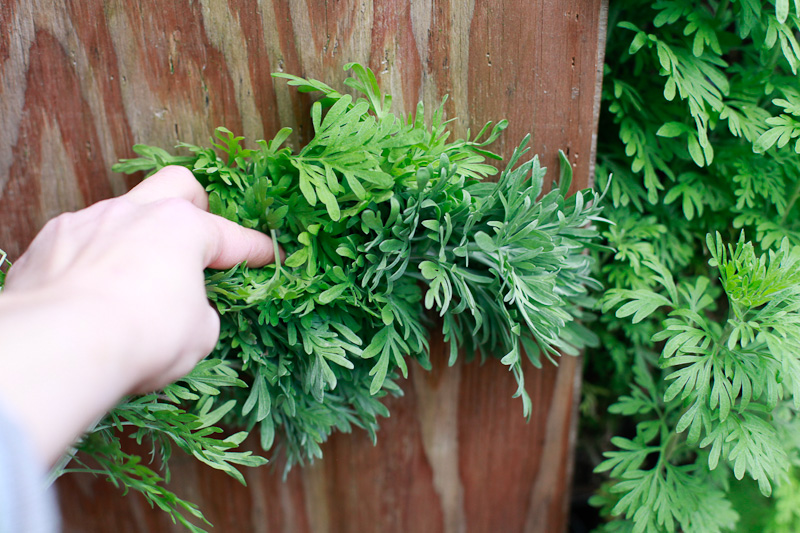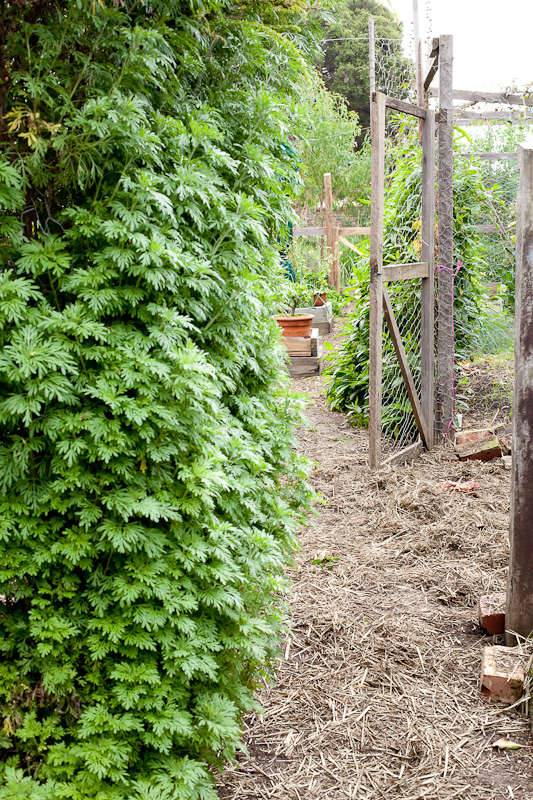In permaculture gardens everywhere people often plant, Artemisia absinthium – Wormwood, near their chicken housing to deter lice and to rid chickens of intestinal worms (if ingested). Wormwood is either boiled in some water and then added to the chickens drinking water or it is cooked with porridge/rice, something they like to eat, and given to them. I too have planted Wormwood near my chickens home due to hearing that it had these wonderful properties. However I am now searching to find academic references that support these claims. A brief search on the internet took me to the Boston Universities Medical School website where it states that ‘there is no data on effectiveness; research shows promise of antioxidant, antimicrobial and antifungal activity’.
The website parastipedia.net which is devoted to sharing information on the biology and control of parasites of livestock suggests that Artemisia absinthium – Wormwood, has effect against fleas if a water infusion is prepared and is capable of expelling gastrointestinal roundworms in sheep, but no mention of chickens. It suggests however that Artemisia vulgaris (Common Wormwood), seems to be effective against some parasitic roundworms and that chickens take it easily.
Linda Marold in her great little book called Chookwise suggests that Artemisia absinthium flowering tops can be simmered in water (4 dessertspoons of dry crushed flowering tops to two cups of water for a minute or two) and then poured into the chickens drinking water (herb and all). Repeat with a fresh mix (change the drinking water each day) for three days. And to be careful not too use for longer as wormwood is a poison in high and consistent doses. She instructs that it must be done in conjunction with extreme cleanliness, and a rotation of pastures, yards and foraging areas.
Joshua Byrne on the ABC’s Gardening Australia fact sheet states: Wormwood Artemisia absinthium and Roman Wormwood Artemisia pontica repel lice and expels intestinal worms if ingested.
In the Iranian Journal of Veterinary Medicine (2012), 6(1):47-50, there is an article on the Antiparasitic efficacy of wormwood (Artemisia absinthium) alcoholic extract on Syphacia obvolata (pinworm). The study suggests that resistance to antiparasitic drugs is mobilising the veterinary science community to look into the medicinal properties of plants such as Artemisia absinthium. Their study (which was performed on mice) showed that when groups of mice received either 5% or 10% concentrations of an alcoholic extract of A. absinthium, the feces of mice showed no Syphacia (pinworm) eggs present. And concluded that Artemisia absinthium may lead to a decline in the number of Syphacia eggs in the feces with minimal side effects.
Another Artemisia species, is also cited in the article; Artemisia sieberi. A. sieberi is found to be one of the most effective candidates against coccidiosis ( a parasitic disease of the intestinal tract of chickens), when Eimeria tenella and Eimeria acervolina species are involved. It was not effective in treating chickens infected by Eimeria maxima.
Every plant has a different chemotype, (is a chemically distinct entity), hence not all Artemisia species perform the same when used medicinally. And the way the plant is prepared also has an impact on its performance as the essential oil concentrations in the plant varies, according to how it is extracted and when it is collected/harvested.




0 Comments